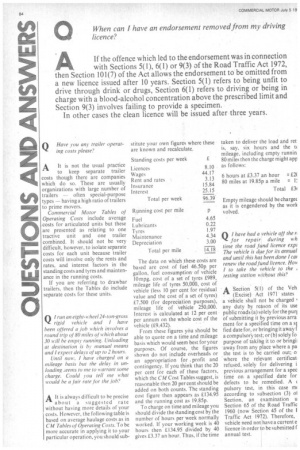Q run an eight-wheel 24-ton-gross NE rigid vehicle and I have
Page 86

If you've noticed an error in this article please click here to report it so we can fix it.
been offered a .lob %vhich involves a. round trip of 80 miles of which about 30 will he empty running. Unloading at destination is by manual means and I expect delays of up to 2 hours.
Until now, I have charged on a mileage basis but the delay in unloading .;eems to me to warrant some charge. Could you tell me what would he a .fair rate for the job?
A It is always difficult to he precise ' about a suggested rate without having more details of your costs. However, the following table is based on average haulage costs as in CM _Tables of Operating Costs. To be more accurate in applying it to your particular operation, you should sub stitute your own figures where these are known and recalculate.
The data on which these costs are based are cost of fuel 46.50p per gallon. fuel consumption of vehicle 10 mpg, cost of a set of tyres £989, mileage life of tyres 50;000, cost of vehicle (less 10 per cent for residual value and the cost of a set of tyres) £7,500 (for depreciation purposes), mileage life of vehicle 250,000. Interest is calculated at 12 per cent per annum on the whole cost of the vehicle (£9.432). . • From these figures you should be able to quote on a time and mileage basis which would seem best for your purposes. Of course, the figures shown do not include overheads or an appropriation for .profit and contingency. If you think that the 20 per cent for each of these factors, which the CM Cost Tables suggest, is reasonable then 20 per cent should be added on both counts. The standing cost figure then appears as £134,95 and the running cost as 19.85p.
To charge on time and mileage you should divide the standing cost by the number of hours per week normally worked. If your working week is 40 hours then £134.95 divided by 40 gives £3.37 an hour. Thus, if the time taken to deliver the load and ret is, say, six hours and the t( mileage, including empty runnin 80 miles then the charge might app as follows: 6 hours at £3.37 an hour = £2( 80 miles at I9.85p a mile = Total £34 Empty mileage should he charge( as it is engendered by the work volved.
























































































































































